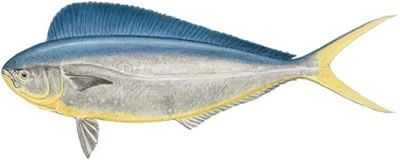Pompano Dolphinfish

Species Details
Coryphaena Equiselis
Coryphaenidae
Perciformes
Offshore, Open Ocean
4 - 77 lbs.
20" - 50"
Pompano Dolphinfish (Coryphaena equiselis) Fish Description
The Pompano Dolphinfish (Coryphaena equiselis) is not in any way related to the marine mammal, rather, a pelagic ray-finned fish found in tropical and subtropical waters all over the world.
This fish is also often confused for the common dolphinfish (or mahi-mahi as others would like to call it) as both fish certainly look alike. Both have elongated fusiform shaped bodies, deeply forked tail fins, and long dorsal fins that run the length of its body. There are, however, several characteristics from where they differ with the size, coloration, and pectoral fin length being the best way to differentiate the two.
An adult Pompano Dolphinfish is a little bit smaller than the adult common one but has a much deeper body shape. Although both fishes have that same bluish-green on top and silver or gold with blue-green overtones on the sides, the Pompano’s color is a lot duller. There may also be some black spots over the head of the Pompano. Lastly, the pectoral fin of an adult common dolphinfish is more than half the length of the head as compared to the Pompano Dolphinfish’s smaller pectoral fins.
The Pompano Dolphinfish’s spawning behavior is quite different from most fish species as it’s known to pair up during spawning instead of congregating in an area to mate with different partners. They are also observed to spawn several times in a year.
Diet and Size
The Pompano Dolphinfish is known to be a strong and fast swimmer. In fact, it can reach speeds of up to fifty miles per hour. And although this fish can measure up to fifty inches in length, the average length tends to be between twenty to twenty-four inches, with an average weight between four to five pounds.
And because they are pelagic, or they tend to stay near the surface of the open water, they most often prey on smaller pelagic fishes such as flying fish; although they would sometimes eat squids as well.
Pompano Dolphinfish Interesting Facts
- The biggest Pompano Dolphinfish on record measures fifty inches and weighs around seventy-seven pounds.
- It is often confused with the much bigger common dolphinfish or mahi-mahi.
- Although not specifically targeted, it is sometimes harvested commercially as it’s mistaken for a young mahi-mahi.
- It is sometimes called Dorado (Spanish for gold) because of its sometimes golden undertone.
- Same as the mahi-mahi, it is targeted by recreational anglers for the challenge of catching this rather feisty fighter.
- Although they can be hooked quite easily, reeling it in can be really tough.
- Its meat is dense and white and has a rich, sweet flavor, which can be cooked in a number of ways.
- Aside from humans, the Pompano Dolphinfish is often eaten by larger fishes such as tuna, marlin, and sharks, and sometimes even some marine birds.
- The Pompano Dolphinfish is said to be easily attracted to objects bobbing on the surface of the water, making them easily targeted by anglers.
- They are commercially harvested in the Caribbean and Hawaii.
Fishing Tips
The Pompano Dolphinfish is usually caught while trolling the open ocean. As it is often attracted to debris, buoys, and other stuff that floats on the surface, it can also be attracted to your boat. It can easily be hooked with any bait you might have but to further increase your chances of hooking one, natural baits of strip fish or squid are your best bet. For the gear, a six to eight-foot medium-action trolling rod paired with a conventional bait-casting reel equipped with a thirty to forty pound-test monofilament is enough to handle this strong and agile fish.
Pompano Dolphinfish Habitat and Distribution
Pompano Dolphinfish’s range is pretty far and wide as they can actually be found in most tropical and sub-tropical waters in the world’s largest oceans. In the US, it can be caught in the western Atlantic Ocean—from North Carolina, Florida, to the Gulf of Mexico. On the other side of the country, it can be caught from Washington State to Baja California. It is also pretty abundant in the waters around the Hawaiian Islands. The fish is also said to prefer swimming near the surface of the open ocean in temperatures above 75°F. And unlike the common dolphinfish that usually wanders near the coastlines, the Pompano Dolphinfish rarely goes near the coasts.







